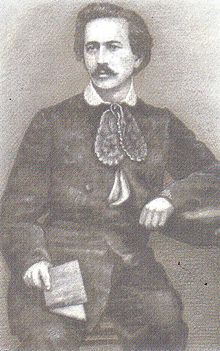Ernst Rudolf Neubauer
Ernst Rudolf Neubauer (born April 17, 1828 in Iglau , Moravia ; † May 4, 1890 in Radautz , Bukowina ) was an Austrian poet.
Life
Ernst Rudolf Neubauer attended grammar school in Iglau and studied law at the Karl Ferdinand University in Prague and philosophy at the University of Vienna . There he was seized by the revolution of 1848/1849 in the Austrian Empire . He published the radical newspaper Der Freie Wiener . As a member of the Academic Legion , he was wounded in street fighting in March 1848. During the siege of Vienna he served as a corps adjutant to commandant Wenzel Messenhauser , who was later shot when the government army conquered Vienna. Neubauer escaped this fate by a hair's breadth. He later described the experiences in his cycle of poems The Legionnaire .
After the revolution he turned to the subject. In 1850 he was sent to the outermost periphery of the Danube Monarchy, to the "educational penal colony" of Bukovina. As a high school teacher at the Imperial and Royal High School in Chernivtsi , he developed a lively educational activity, teaching literature and history for over 25 years . He promoted literarily gifted students such as Karl Emil Franzos and Mihai Eminescu .
In addition, Neubauer devoted himself to journalism . In 1862 he founded his own printing company and published the first German-language newspaper, the state and official newspaper Bukowina , which he edited until 1869. Their supplement Sunday newspaper of Bukovina became a literary forum for young Bukovinian authors. Neubauer's employees included Ludwig Adolf Staufe-Simiginowicz , Moritz Amster and Jurij Fedkowytsch . With money not on good terms, Neubauer had to sell the print shop and his house after seven years in order to be able to pay off the debts.
In 1872 he was appointed director of the high school in Radautz. Honored as a school councilor (title) , he retired in 1884. He devoted himself entirely to his poetic activity. After his death he was buried in the city cemetery of Radautz. The community set up an honorary gravestone.
plant
- Reeds and willow . Poems. Stöckholzer von Hirschfeld, Vienna 1847. ( digitized version )
- Austrian patriotic songs . Printed by the Mechitaristen, Vienna 1849. ( digitized )
- Ceremonial poem to welcome "His Imperial Majesty Franz Joseph I."
- The four regions of marriage. Poems to Amalie. Vienna 1855 ( digitized version )
- Songs from Bukovina . Manz, Vienna 1855. ( digitized version )
- Stories from Bukovina . Chernivtsi 1868 ( digitized edition 1869 )
- Roxolan and Carpa
- Nogaia or The Steppe Battle . Kiemer, Radautz 1876
- Text for the illustrated book “Die Illustrierte Bukowina” by Franz Xavier Knapp
- Attempt to present sources for the relations between Poland and Austria at the time of Emperor Maximilian II and his son Maximilian the German master. Eckhardt, Czernowitz 1870.
- Concerning the participation of Norman princes in the first crusade and the "consequences" of this participation for the Norman states, cited by some historians. Eckhardt, Czernowitz 1872. ( digitized version )
- Basics of the history of the Seretland . Author's publishing house, Radautz 1874.
- Nogaia or the Noggen Gorge. A memorial song and Sowatland. Riemann, Radautz 1875.
- The Gudrunlied and Tristan. Two contributions to the history of Middle High German poetry . Eckhardt, Czernowitz 1876.
- Anacreon of Teos . Eckhardt, Radautz 1876.
- Prince Konstantin Brancovan , 1877
- The ideons . A poem in 50 songs. Richter, Hamburg 1882.
- The trade for the soul. Czernowitz 1886. [( http://universaar.uni-saarland.de/monographien/volltexte/2015/142/pdf/bogner_neubauer_komplett.pdf digitized])
“The grandiose poetic work Die Ideonen has unfortunately hardly been explored in literary studies until today. Neubauer's dramatic works, which were performed in Chernivtsi at the time, have also been forgotten today: "The girl from Kaliczanka" (1865), "The trade for the soul" and others. "
Neubauer was also an excellent impromptu poet who used the most difficult forms in his improvisations , for example ancient stanzas, stanzas , sonnets and terzins . In many cities in the German-speaking area (Dresden, Vienna, Leipzig) he performed with great success.
literature
- H. Stănescu: Neubauer (Ernst) Rudolf Vinzenz. In: Austrian Biographical Lexicon 1815–1950 (ÖBL). Volume 7, Verlag der Österreichischen Akademie der Wissenschaften, Vienna 1978, ISBN 3-7001-0187-2 , p. 80 f. (Direct links on p. 80 , p. 81 ).
- Peter Rychlo , Oleg Liubkivskyj: Czernowitz City of Literature , 2nd, improved edition. Chernivtsi 2009, p. 23 ff.
Web links
- Neubauer, Ernst Rudolf . In: East German Biography (Kulturportal West-Ost)
References and comments
- ↑ October Uprising in Vienna (1848) ( Memento of the original of June 13, 2007 in the Internet Archive ) Info: The archive link was automatically inserted and not yet checked. Please check the original and archive link according to the instructions and then remove this notice.
- ↑ On October 22, 1851, the emperor visited Bukovina for the first time
- ↑ erotic poems, dedicated to his wife
- ↑ The Huns at Cecina Castle near Chernivtsi
- ↑ Verse epic about the collapse of Mongol rule in 1292 in Bukovina
- ↑ Overview of the history of human development, the "Ideons". Neubauer worked on philosophical poetry for 20 years
| personal data | |
|---|---|
| SURNAME | Neubauer, Ernst Rudolf |
| BRIEF DESCRIPTION | Austrian author, publisher and teacher |
| DATE OF BIRTH | April 17, 1828 |
| PLACE OF BIRTH | Iglau |
| DATE OF DEATH | May 4, 1890 |
| Place of death | Radautz |
